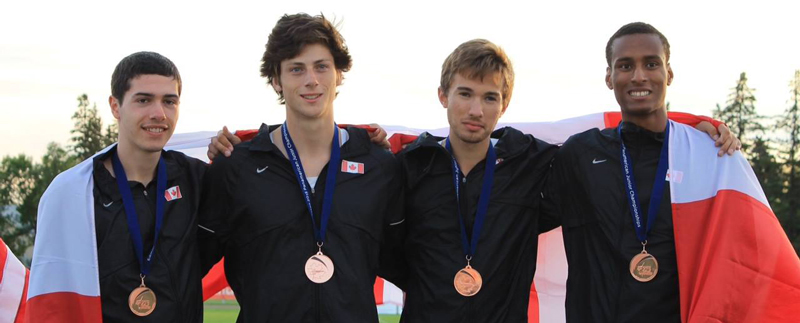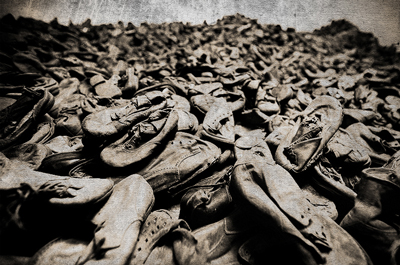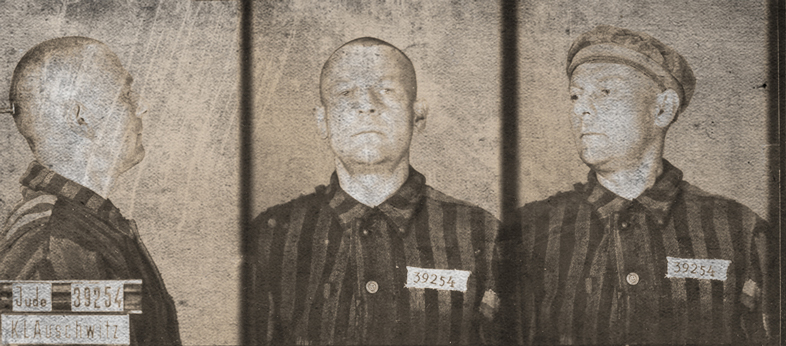Daniel also saw the railroad tracks heading outside the compound. Not to freedom, but to the gas chambers of Auschwitz. His grandfather was on that train.
Some of Daniel’s earliest memories are of stories that have been told among the Bradys for 70 years: How his grandfather’s family, Jews in Nazi-occupied Czechoslovakia, fell victim to the horrors of the Holocaust. Only George Brady, Daniel’s grandfather, survived.
Daniel is a lot like him. They share a focus, compassion for others, sense of humor, and determination to succeed when the odds say otherwise.
Daniel’s outlet is track and field. A rising sophomore, Brady ran one of the fastest times ever by a Stanford freshman in the 400-meter hurdles and recently earned a bronze medal for Canada at the Pan Am Junior Championships, a prominent international competition for those 19 and under.
Daniel wears a number pinned to his singlet. George also has a number – B11498 -- but this one is permanently etched into his arm.
As much as it reminds George of tragedy, it also is a comfort.
“Now, when I have problems,” said George, 87, in a deep-rooted Czech accent, “I look at my number and my problems disappear.”
Nove Mesto na Morave is a Moravian village in the Czech Republic and a mecca for cross country skiing and ice skating. Skis were made there and distributed through the roads and railways that made the town a hub in the Vysocina Region.
Karel Brady, George’s father, was a prominent figure in Nove Mesto. He was captain of the local soccer side, an actor in community theater, volunteer firefighter, and ski-race announcer when his booming voice needed no microphone.
He taught his children, George and Hana, magic tricks, and began a Brady tradition of distracting others at the table and stealing tasty morsels off their plates. Memo to Brady guests: If someone yells “Spider!,” don’t turn away.
Marketa, called Greta, helped run the family’s general store and was known for her laugh, willingness to chat, and for her great care of her children.

George Brady (with sister Hana, at left) lived an idyllic childhood in the mountains of Czechoslovakia.
Life began to change in the fall of 1938 when Adolf Hitler’s forces annexed the border regions of Czechoslovakia and installed the anti-Semitic laws that had become prevalent in Germany. Concentration camps already had been established in places like Dachau and Buchenwald.
Greta was the first to go, arrested by the Gestapo in spring 1941 for sending money to her escaped brother. She was sent to Ravensbruck, in northern Germany. Her children rarely heard from her, with an exception being a gift of hearts made from bread she chewed and shaped lovingly into charms.
Of the 130,000 women brought to Ravensbruck over the course of the war, only 15,000 survived.
Karel was next, taken in September 1941 with all four other Jewish adult men in town as punishment when one of them refused to wear the Star of David on his jacket.
Essentially orphaned, George and Hana moved in with a non-Jewish uncle, but were deported in May 1942. On the way to Terezin, Hana turned 11. Of the 15,000 children sent to Terezin, fewer than 300 survived.
Terezin was an 18th-century fortress designed for 7,000. At its height, the camp housed 58,000. The overcrowded conditions were infested with bed bugs, lice, and fleas. Typhoid, polio, scarlet fever, and malnutrition were rampant. On Nov. 11, 1943, all 40,000 prisoners, including George and Hana, were ordered to stand in freezing weather for a census. Three hundred died of hypothermia.
There were attempts at normalcy. Bauhaus artist Friedl Dicker-Brandei secretly taught art to hundreds of children, including Hana, in the attics. They produced more than 4,000 drawings, which Dicker-Brandeis hid in two suitcases before being sent to Auschwitz, where she died.
As awful as Terezin was, “It was a spa compared to Auschwitz,” said George, who arrived at hell on earth in September 1944 on the first of 10 transports from Terezin. More than 1.1 million would be killed there – 90 percent of them Jews.

Auschwitz was the end of the line, literally and figuratively, for nearly every Jew who entered the concentration camp.
“Tell them you’re healthy,” said a fellow prisoner as they prepared to be sorted – a life or death moment. Only the hardiest would be selected to work at hard labor. The alternative was termination.
“I was brought in front of Josef Mengele, the famous Doctor of Death,” George recalled. “I said, ‘gesund,’ which means ‘healthy’ in German. I thought I made a mistake because it looked like we were in the strong group and two of my friends were in the weak group. I worried that we would go for hard labor and they for light labor. It turned out we went for work and they went to death.”
The new workers were placed in a large room and divided into carpenters, iron workers, and laborers for interrogation. The interrogator was one of the prisoners.
“How old are you?”
“Sixteen,” George replied.
The man struck George in the face.
“How old are you?” he asked again.
“Sixteen,” he said more politely than before.
Another blow.
“How old are you?” he asked again.
Finally, someone got George’s attention.
“Tell them you’re 18,” the man whispered.
“Tell them you’re healthy,” said a fellow prisoner as they prepared to be sorted – a life or death moment. Only the hardiest would be selected to work at hard labor. The alternative was termination.
George did and the guard stopped hitting him. He was allowed to join the rest of the workers.

Auschwitz today looks as bleak as it did 70 years ago.
Still, there was doubt. A commander selected workers for a satellite camp. George, spindly and boyish looking even for 16, boldly told him, “I’m 18 and I’m an ironworker.”
The commander saw through it: “Too young!”
But when the commander turned his head, George jumped into the group of ironworkers and remained there undiscovered.
A month later, Hana arrived. At 13, she was too young for hard labor.
In January 1945, the Allies were bearing down. Auschwitz was largely evacuated and prisoners were sent on a death march ahead of the Soviet troops. George, who had been working at a satellite camp called Gleiwitz, a railway car factory, was roused in the middle of the night. He was given a loaf of bread and told this was his entire food supply for the next 10 days.
“We started to march,” George said. “If you couldn’t walk anymore, they shot you.”
Cold, starving, and sleep-deprived, the prisoners were told to stop at Blechhammer, a former British POW camp surrounded by a large concrete wall lined with barbed wire and guard towers. The area was strategic as an industrial center with a synthetic gasoline factory.
It had running water – hot water. Having not washed properly for months, this was too incredible to resist. George’s small group entrusted a friend with their bread while they left to bathe. Upon return, they found the guard asleep and all the bread had been stolen.
George thought he was as good as dead. “That was my grand finale,” he said.
What happened next was pure chaos. The Red Army was coming and the Nazis responded by killing its’ own prisoners, launching grenades into the camp as the Soviets began to attack.
Explosions thundered through the barracks as the prisoners huddled in whatever corners and crevices they could find.
A Soviet tank blasted a hole through the concrete wall, and as fast as their emaciated bodies could carry them, George and several others squirmed through amidst the smoke.
Still dressed in prison garb, they didn’t risk being seen. They crawled through the forest to the nearest village – Ehrenforst. The villagers had evidently left in a hurry because the town was deserted and food remained on the tables.
George found an elegant green riding jacket and ditched his uniform. It was January 21, 1945. George Brady was free.
He spent months wandering through Poland, Ukraine, Hungary, and Czechoslovakia before feeling safe enough to return to Nove Mesto a week after the war ended. He was told his parents had died in Auschwitz three years earlier. There had been no news about Hana.
“I was always hoping that somehow, somewhere, she survived,” George said.
While walking through the Czech capital of Prague, George was stopped by a woman he did not know and identified herself as a friend of Hana’s. She had seen Hana in Auschwitz, and confirmed her fate. George was alone.
For the next year, George felt aimless, while the growth of communism further complicated matters. The family store was shut down for nationalized commerce.
With the Iron Curtain rising higher and unwilling to live under yet another dictatorship, Brady planned another escape, this one with an element of cloak-and-dagger. It involved a leap from a train in Austria and a payment in cigarettes for a streetcar ticket to Vienna’s American zone.
George eventually made his way to Canada in 1954 and settled in Toronto, where he started a plumbing business with a fellow Holocaust survivor, married and had four children. Daniel is among seven grandchildren.
The tales were mostly confined to the family until a Japanese woman, Fumiko Ishioka of Tokyo’s Holocaust Education Resource Center, was loaned a suitcase from Auschwitz with the name “Hana Brady” painted on the side as an artifact in 1999. Thus began Fumiko’s quest to find out more about Hana, which led to discovery of the secret art classes at Terezin and the children’s drawings, now housed at the Jewish Museum in Prague.
In an effort to further piece together Hana’s story, Fumiko found George’s name from a Terezin transport list, heard he was alive, and traveled to Canada to meet him and unravel the family’s history.
Fumiko’s tirelessness inspired a news article, followed by a radio documentary, book (“Hana’s Suitcase” has been translated into 40 languages), award-winning film documentary, docu-drama, and stage production -- “Hana’s Suitcase” is coming to Seattle in January.
Over the past 15 years, George has become an inspiration to children around the world as a symbol of resilience, hope, and tolerance. He has received 13,000 letters, many from children who have experienced loss and figuring how to cope. George answers every letter with encouragement, and encloses a photo of himself and Hana from carefree days.
“My grandpa doesn’t think of himself as a hero,” said Daniel. But that’s what he has become, particularly to his family.
“My grandpa has been a huge influence on me … After coming from such a dark past, he’s the most positive, optimistic, and inspiring person that I have ever met.”
» Daniel Brady

Daniel and George Brady at the family cottage in Muskoka
George long ago committed himself to forging a family-centered life with values that would make his deceased parents proud. Daniel has embodied that vow.
An excellent student and athlete, Daniel developed into one of the top young track athletes in Canada. Three times he’s represented his country in international competition, including the Pan Ams earlier this month in Edmonton.
“I recruited Daniel really off potential,” said Jody Stewart, Stanford’s associate head coach for sprints and hurdles. “He’s going to do great things at Stanford.”
Why is Stewart so sure? Because of what he witnessed during Brady’s freshman year.
Two weeks after school began, Daniel walked into the locker room and noticed a buzzing sound in his left ear. By the end of the day, he was deaf in that ear and could not walk because of dizziness.
For a couple of days, he tried to deal with it on his own, before relenting and flying home to see his Canadian doctor. He remained in Toronto for 3 ½ weeks.
“It was a very scary situation,” Stewart said. “We were just trying to figure things out.”
Daniel was diagnosed with sudden hearing loss, a quick-striking affliction where the cause is almost never known.
Daniel was able to keep up with his class work through on-line curriculum generated by understanding professors. Physically, he tried to regain his equilibrium by repeating the actions that caused the most discomfort.
“Whatever actions make you dizzy, you’re supposed to do them as much as possible because your brain has to learn how to balance off of one ear,” Daniel said.
But Daniel refused to retreat from his goals. Though he redshirted indoors, he vowed to compete outdoors, remaining focused on making the Canadian Pan Am team, as unrealistic as it seemed.
Daniel had lost all his fitness by the time he returned to Stanford, laying waste to most of his off-season preparation. He still was dizzy and felt throbbing in his ear, and though he competed admirably, Brady felt frustrated.
“I’m used to feeling in shape – almost invincible – when I run,” he said. “When you’re feeling good, you feel like you can do anything. But, for at least half of the outdoor season, it felt like it was an uphill battle. You’re just fighting and fighting to get back to where you were, not even trying to get better.”
Even then, Stewart saw the qualities that seem to be family traits.
“Losing your balance as a hurdler is a major concern,” Stewart said. “But the thing about Danny is he was willing to persevere.”
All season, Brady’s 400 hurdles times were consistently in the 54-second range – but at the Canadian championships in early July, he dropped to 52.94. His runner-up finish secured a spot for Canada.
“I 100 percent did not think I would make the national team,” Brady said. “Especially considering those days when it seemed like everything was falling apart.”
Wearing a Canadian uniform for the first time on home soil, Brady improved even more, to a season-best 52.52, just missing the Pan Am final by one place. A day later, his leadoff leg helped Canada to third in the 4x400 relay, earning him a bronze medal.

Daniel’s challenging season ended with a Pan Am bronze for Canada.
“You looked at his times during the year and you don’t see the challenges and obstacles the kid faced,” Stewart said. “He put it all together in, literally, three months. Six months ago, that wouldn’t have seemed possible.”
On a mid-July afternoon at the family cottage in Muskoka, Ontario, George and Daniel reflected on the legacy that Auschwitz helped create so long ago.
“There’s an outlook on life that our family has,” Daniel said. “It’s a mentality, a determination. There’s no problem that’s too great.”
Around them, the green of the lush forests and the blue of the sky seemed to go on forever. The deck offered a stunning view of the lake below.
“You have to accept what happened and cope with it,” George said. “Don’t burden yourself with the past, but live for the future.”
Daniel was listening.
For a family perspective of the Holocaust, visit the Brady family Web site at: hanassuitcase.ca






